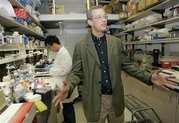
Thanks once more to Lilit Marcus who is a fantastic story finder for me! Now that Larry has a job I’m recruiting readers who can forward me current events related to depression and bipolar disorder. Since I never seem to be able to read the dang paper before Eric disposes of it. (Remember, major clutter control going on in my home.)
Lilit sent me this fascinating AP story about a psychiatric geneticist at the University of California, San Diego, who is selling bipolar genetic tests over the Internet.
WHAT?
Here’s a clip of the AP story that you can get to by clicking here.
Dr. John Kelsoe has spent his career trying to identify the biological roots of bipolar disorder. In December, he announced he had discovered several gene mutations closely tied to the disease, also known as manic depression.
Then Kelsoe, a prominent psychiatric geneticist at the University of California, San Diego, did something provocative for the buttoned-down world of academic medical research: He began selling bipolar genetic tests straight to the public over the Internet last month for $399.Tests have become available claiming to help predict and diagnose everything from serious illnesses like cancer and Alzheimer’s to athletic ability and a person’s ideal diet. Psynomics’ offering is one of the first psychiatric gene tests on the market.
His company, La Jolla-based Psynomics, joins a legion of startups racing to exploit the boom in research connecting genetic variations to a host of health conditions. More than 1,000 at-home gene tests have burst onto the market in the past few years.
The proliferation of these tests troubles many public health officials, medical ethicists and doctors. The tests receive almost no government oversight, even though many of them are being sold as tools for making serious medical decisions.
Health experts worry that many of these products are built on thin data and are preying on individuals’ deepest anxieties.
“People are always rushing to the market on the basis of one or two studies,” said Dr. Muin Khoury, director of the National Office of Public Health Genomics at the Centers for Disease Control and Prevention. “We have very little evidence that telling people their genetic information is going to make any difference.”
Kelsoe, 52, acknowledges that bipolar disorder probably results from a combination of genetic factors and life experiences, and that the presence of these gene variations does not at all mean that someone will, in fact, develop the disease. He admits, too, that his findings about the genetic basis of the illness are far from complete.
But he said his test is a vital starting point toward moving away from the notoriously tricky practice of diagnosing bipolar disorder based purely on a person’s behavior.
“The goal of this is to try and help doctors make an accurate diagnosis more quickly so the patient can be treated appropriately,” Kelsoe said. “Anything is going to help, even if it just helps a little bit.”

